5 Open Source Alternatives To Google Drive
The best Cloud, Cloud Storage, and Database tools similar to Google Drive
NextCloud stands out as a leading open-source alternative to Google Drive. For those seeking different features or workflows, we've curated a comprehensive list of Google Drive alternatives, each offering unique strengths.
Notable mentions in the Google Drive alternative space include: OwnCloud, Filebrowser, Seafile, Sandstorm.
The Google Drive ecosystem primarily consists of Cloud solutions, with additional options in Cloud Storage, Database. Explore these alternatives to discover tools that align with your specific Google Drive-related requirements, whether you're looking for enhanced features, different user experiences, or specialized functionalities.
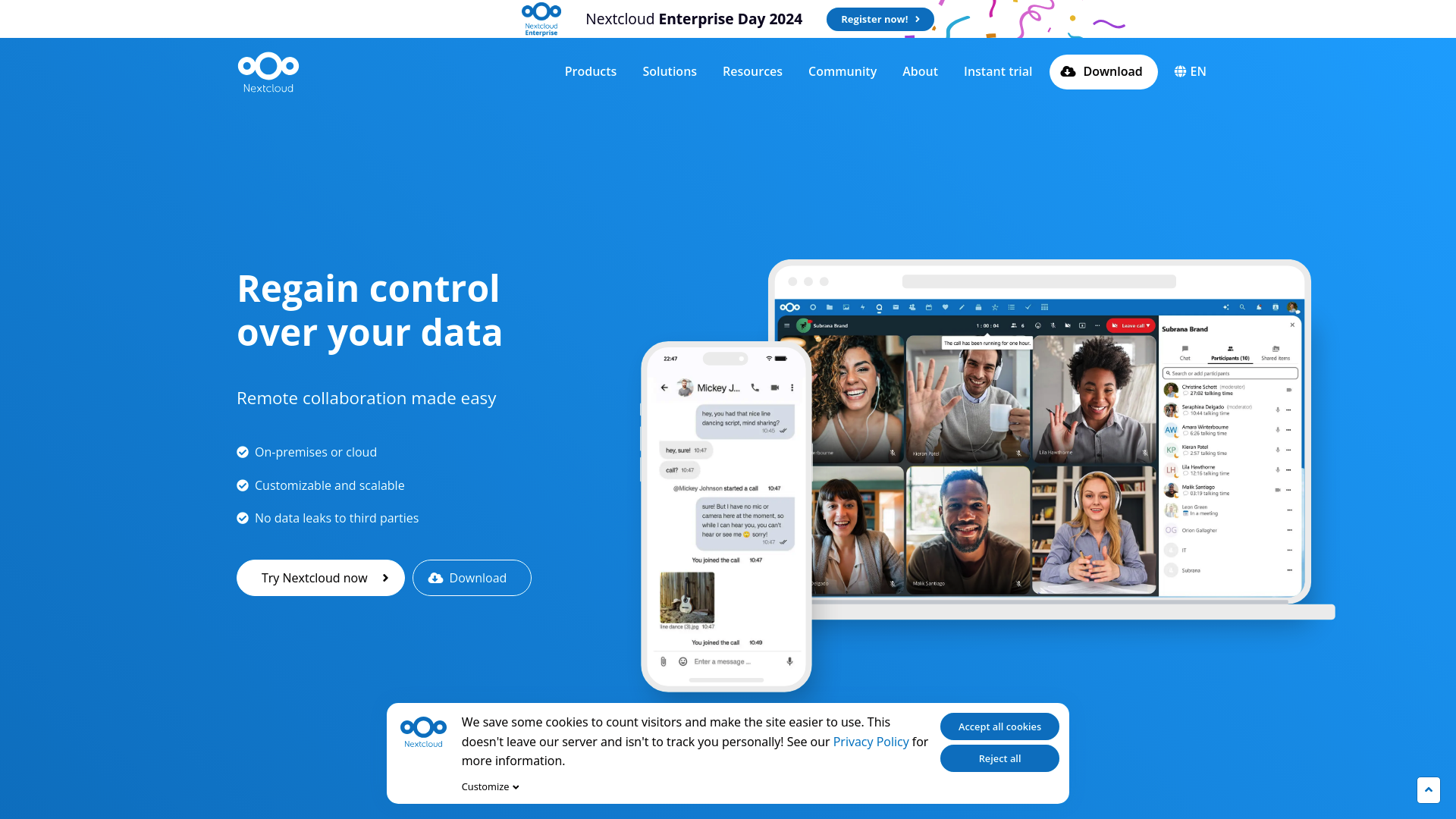
Nextcloud is a leading open-source platform designed to provide secure, self-hosted content collaboration. It integrates file storage, real-time document editing, video conferencing, and groupware into a single, comprehensive solution. Trusted by thousands of organizations worldwide, Nextcloud ensures data sovereignty and compliance with privacy regulations, making it the go-to choice for enterprises, public sectors, and educational institutions alike.
- File Sync and Share: Seamlessly sync and share files across devices with desktop, mobile, and web interfaces.
- Talk: Conduct private, on-premises audio/video conferencing and text chat with integrated screen sharing and SIP integration.
- Groupware: Manage calendars, contacts, and emails to enhance team productivity and streamline workflows.
- Office: Collaborate on documents in real-time with a powerful LibreOffice-based online office suite supporting all major file formats.
- Assistant: Utilize a local AI assistant for content generation, data queries, email summarization, translation, and more.
Nextcloud is designed to empower users with full control over their data, ensuring that no information leaks, not even metadata. With continuous improvements from a vibrant open-source community and enterprise-grade support, Nextcloud remains the most popular on-premises content collaboration platform available today.
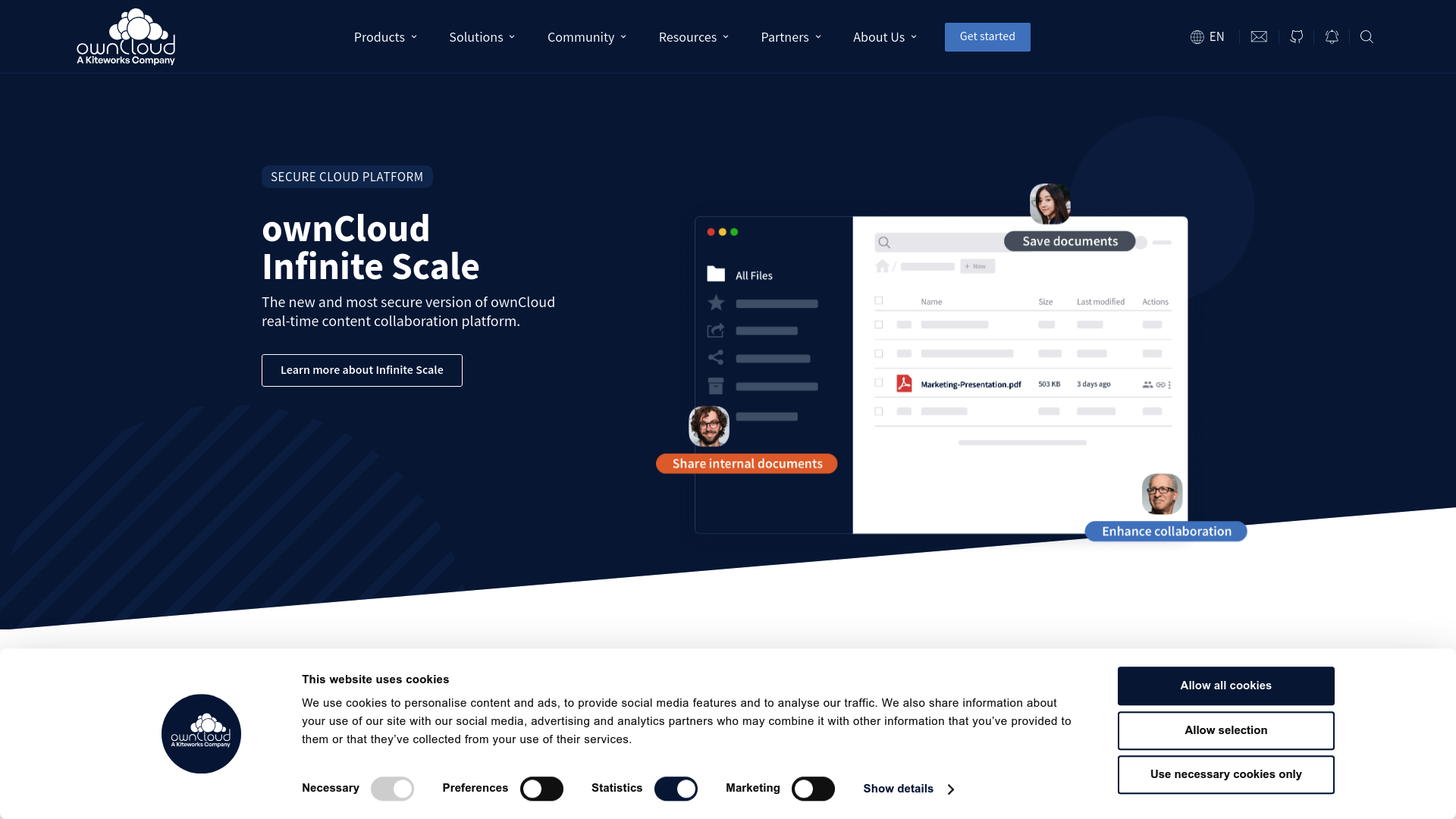
ownCloud is a versatile platform designed for secure file sharing and data management. It provides organizations and individuals with the tools they need to control and share their data safely and efficiently, whether on-premises or in the cloud. With ownCloud, you have the flexibility to deploy in a data center of your choice or opt for a hybrid setup, ensuring compliance with various data governance regulations and certifications. For those who prefer a SaaS solution, ownCloud.online offers a fully hosted service in Germany, providing data sovereignty without the hassle of infrastructure management.
- Secure Sharing: Share files and folders safely with internal and external parties, protected by passwords and expiration dates.
- Real-time Collaboration: Work simultaneously on documents, create presentations together, and annotate files in real-time.
- Data Sovereignty: Maintain full control over your data, with multi-factor authentication, encryption, and file lifecycle management.
- Integration: Open APIs and modularity allow seamless integration with various tools and platforms, including Microsoft 365, Teams, and Outlook.
- Compliance: Ready for GDPR, LGPD, CCRF, HIPAA, and CCPA compliance, ensuring your data meets all regulatory requirements.
ownCloud enhances productivity by eliminating the need for slow VPN connections and unversioned email attachments. It provides a secure, efficient way to collaborate and manage data, making it a trusted solution for over 200 million users worldwide.
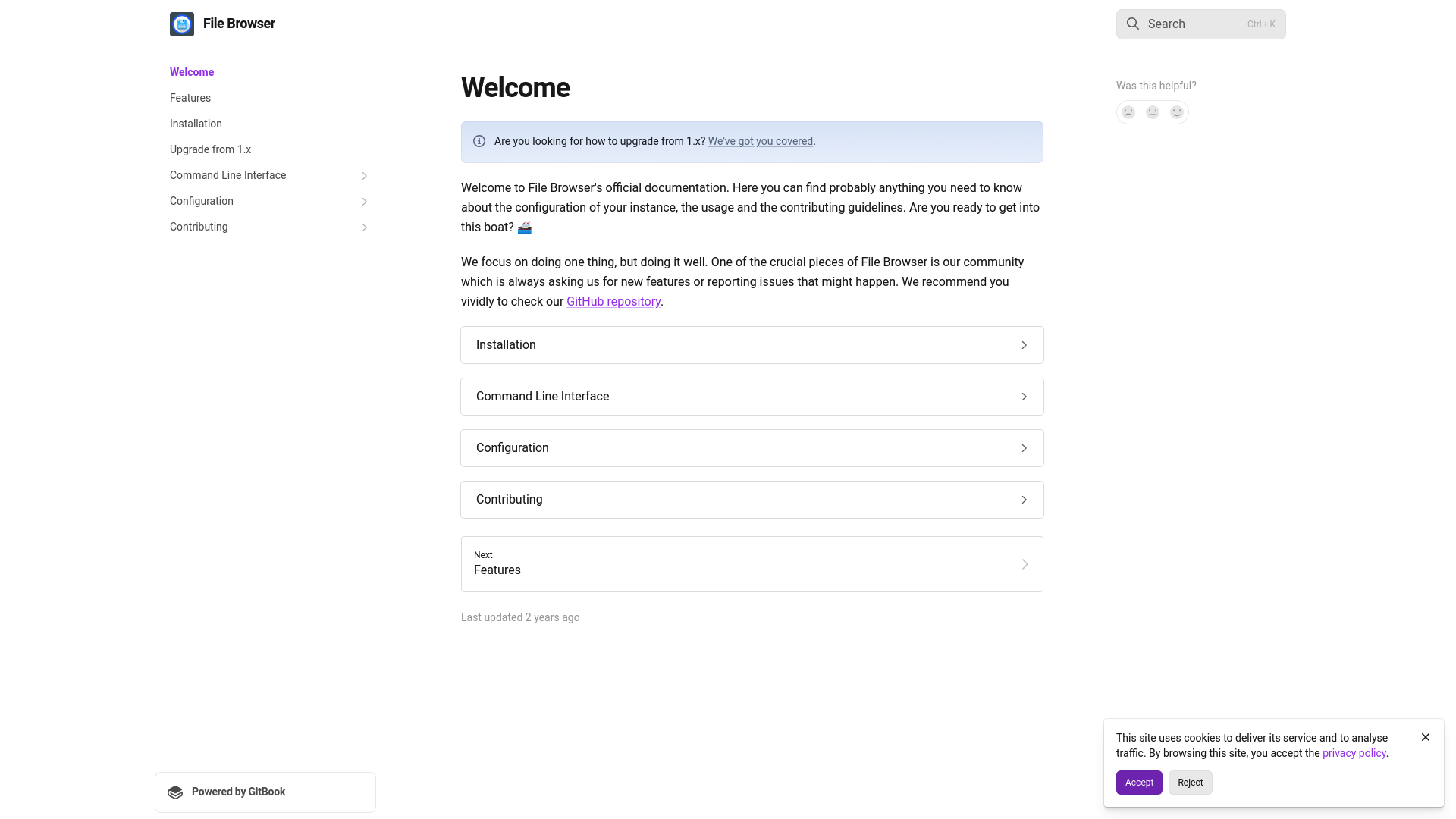
File Browser is an open-source web-based file management tool designed to simplify the process of managing files through a user-friendly web interface. It aims to provide a seamless experience for users to navigate, upload, and organize their files efficiently.
- User-Friendly Interface: Navigate and manage your files with an intuitive web interface.
- Command Line Interface (CLI): Perform file operations and configurations via a powerful CLI tool.
- Custom Branding: Personalize the look and feel of the interface to match your brand.
- Authentication Methods: Secure your files with various authentication options.
- Command Runner: Automate tasks and run commands directly from the interface.
- Community-Driven: Benefit from a community that actively contributes new features and fixes.
File Browser stands out by focusing on doing one thing exceptionally well—file management. With robust support for customization and a strong community backing, it is a reliable choice for individuals and organizations looking to streamline their file management processes.
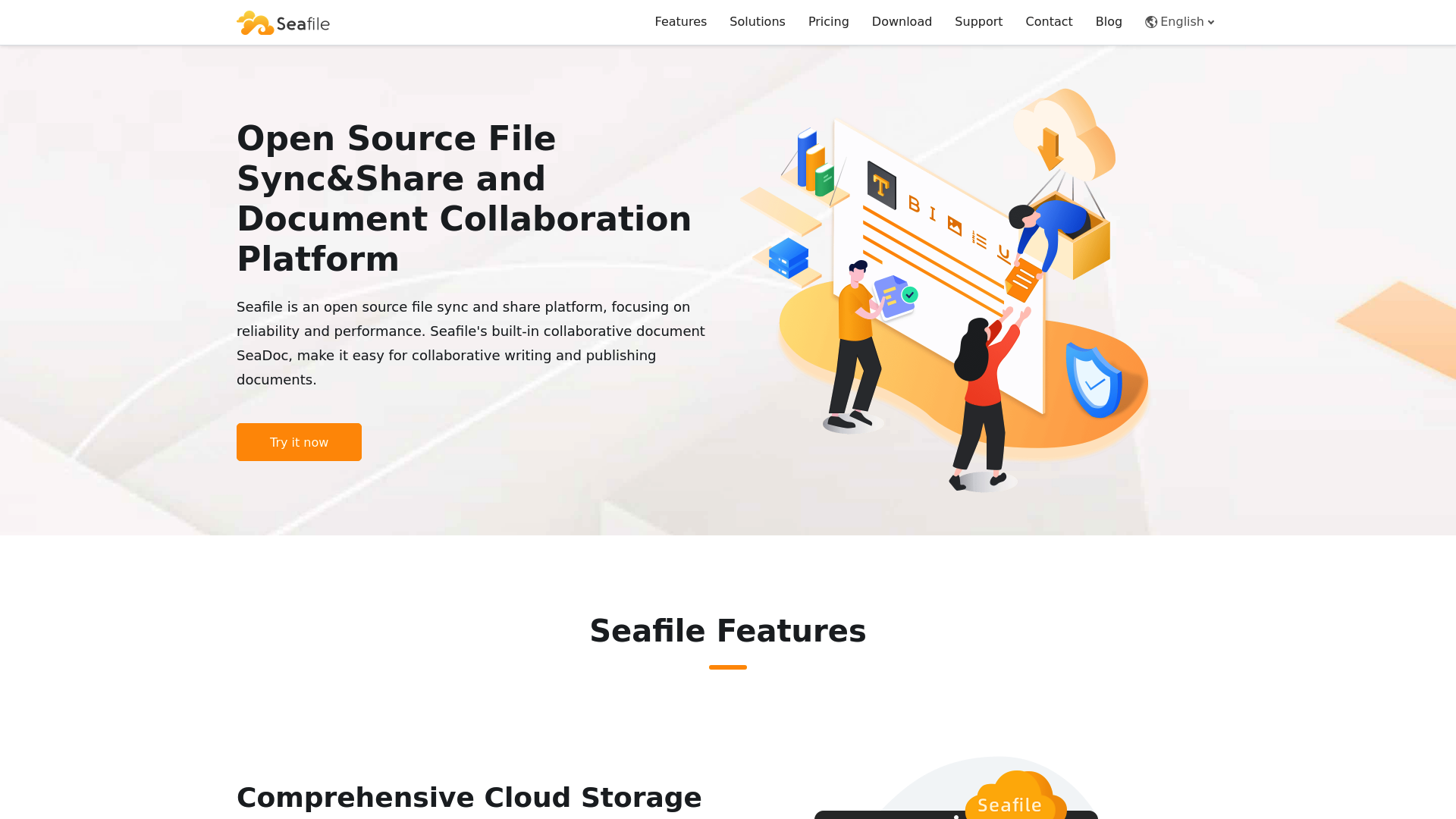
Seafile is an open source platform designed for reliable file synchronization, sharing, and document collaboration. It offers a robust set of features to ensure seamless, efficient, and secure file management across multiple devices and platforms. Seafile is trusted by millions of users worldwide for its performance and reliability.
- Comprehensive Cloud Storage: Store, manage, and share files with support for various file types. Access your files on any device with clients for Windows, Mac, Linux, iOS, and Android.
- Powerful Sharing Collaboration: Enjoy online document editing, file locking, permission management, version control, and event notifications for efficient teamwork.
- Stable and Reliable File Sync: Benefit from reliable file synchronization and data integrity checks, ensuring data safety and preventing loss or corruption.
- High Performance: Sync tens of thousands of files in under a minute with low hardware resource consumption, suitable for enterprises of all sizes.
- Integrated Collaborative Document Editor: Use SeaDoc for real-time collaborative document creation, management, and publishing directly within the platform.
Seafile's design ensures fast and reliable file syncing, capable of syncing 10,000 small files within a minute. With over 10 years of real-world usage and more than 1 million users, Seafile has proven to be a stable and reliable solution for file synchronization and sharing. Trusted by thousands of teams, companies, and organizations worldwide, Seafile is a top choice for those seeking a high-performance, secure, and collaborative file management platform.
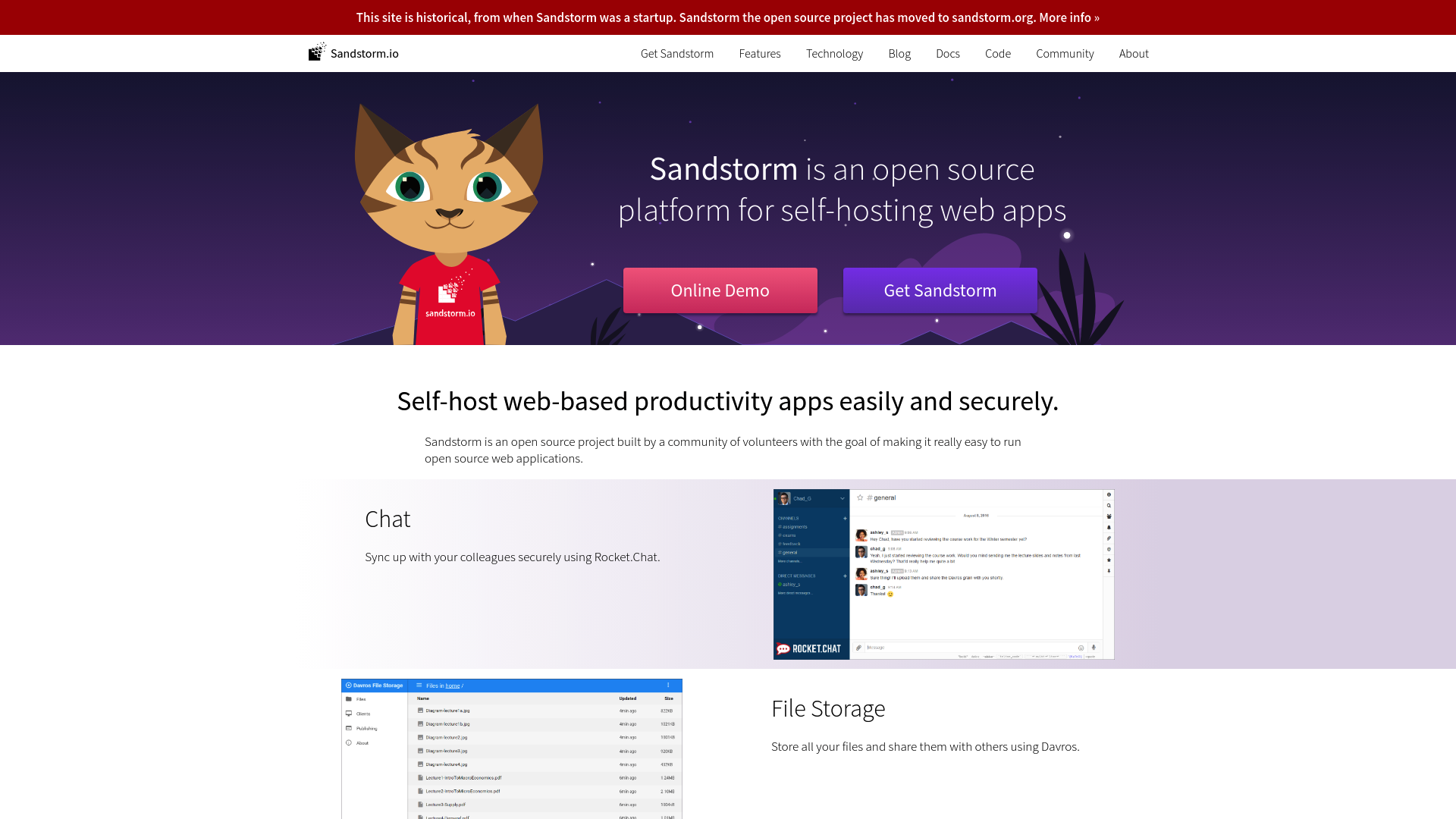
Sandstorm is an open-source platform designed to simplify the self-hosting of web-based productivity applications. Built by a community of volunteers, Sandstorm aims to make it incredibly easy to run open-source web applications securely and efficiently.
- Chat: Sync up with your colleagues securely using Rocket.Chat.
- File Storage: Store all your files and share them with others using Davros.
- Task & Project Management: Organize all your tasks and ideas using Wekan.
- Document Editing: Create, edit, and collaborate on documents with Etherpad.
Sandstorm stands out due to its focus on usability, security, and freedom. Installing apps on Sandstorm is as easy as installing apps on your phone. The platform offers a unified access control system, ensuring that all your apps and data are in one place and private by default. Sandstorm's security model containerizes each document, chat room, and other data into secure sandboxes, mitigating 95% of security vulnerabilities automatically.
Sandstorm gives you the freedom to choose where your data lives, whether in the cloud or on your own machines. This flexibility ensures that you are never locked into walled gardens, allowing you to mix and match apps from various developers or even add your own. Many Sandstorm apps are open-source, providing you the ability to modify them to suit your needs.
Sandstorm is ideal for individuals who want a secure and easy way to use open-source web apps, businesses that need to keep all their data in one place while allowing teams to choose their own tools, and developers who want to ship their code without worrying about running or scaling a service.
Discover Open Source Alternatives to:
View allTypeform
Customize your cookie settings for tailored content.
Contentful
NewContentful acquires Ninetailed to boost AI-driven personalization.
1Password
Empower teams with secure access management.
Airtable
Empower teams to create custom apps without coding.
Notion
All-in-one workspace with AI integration.
tableau
Tableau helps people see, understand, and act on data.